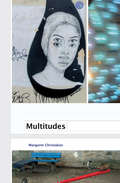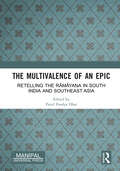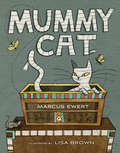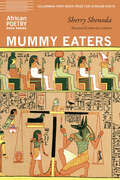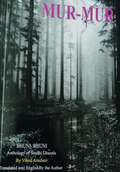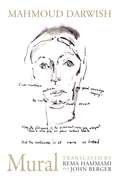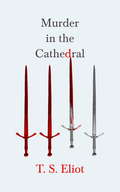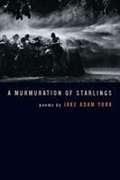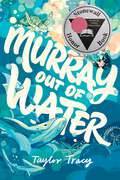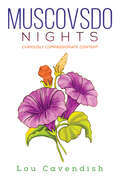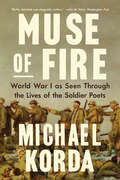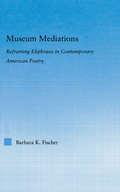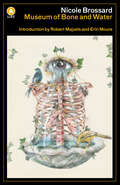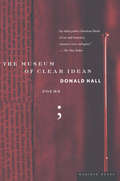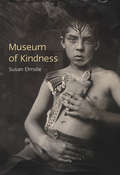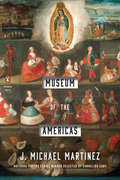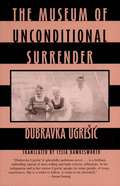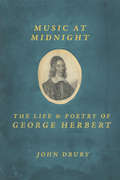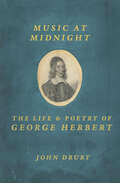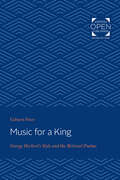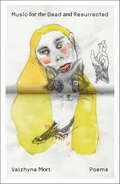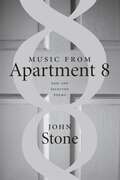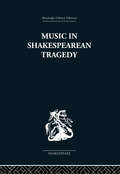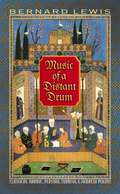- Table View
- List View
Multitudes
by Margaret ChristakosRevelling in the value of social polyphony from Walt Whitman's "Song of Myself," Multitudes looks at its contemporary theatres of Facebook and Twitter, post-riot police surveillance, protest culture and poetry itself. With wit, perceptiveness and her trademark linguistic sonar, Margaret Christakos keenly examines intimacies and banishments, as well as intergenerational grief, self-display and social hope.
The Multivalence of an Epic: Retelling the Rāmāyaṇa in South India and Southeast Asia
by Parul Pandya DharThis volume examines The Rāmāyaṇa traditions of South India and Southeast Asia. Bringing together 19 well-known scholars in Rāmāyaṇa studies from Cambodia, Canada, France, India, Indonesia, Malaysia, Singapore, Thailand, UK, and USA, this thought-provoking and elegantly illustrated volume engages with the inherent plurality, diversity, and adaptability of the Rāmāyaṇa in changing socio-political, religious, and cultural contexts. The journey and localization of the Rāmāyaṇa is explored in its manifold expressions – from classical to folk, from temples and palaces to theatres and by-lanes in cities and villages, and from ancient to modern times. Regional Rāmāyaṇas from different parts of South India and Southeast Asia are placed in deliberate juxtaposition to enable a historically informed discussion of their connected pasts across land and seas. The three parts of this volume, organized as visual, literary, and performance cultures, discuss the sculpted, painted, inscribed, written, recited, and performed Rāmāyaṇas. A related emphasis is on the way boundaries of medium and genre have been crossed in the visual, literary, and performed representations of the Rāmāyaṇa. Print edition not for sale in South Asia (India, Sri Lanka, Nepal, Bangladesh, Pakistan and Bhutan)
Mummy Cat
by Lisa Brown Marcus EwertDeep within this maze of stone, a creature wakes up, all alone . . . Mummy Cat prowls his pyramid home, longing for his beloved owner. As he roams the tomb, lavish murals above his head display scenes of the cat with his young Egyptian queen, creating a story-within-a-story about the events of centuries past. Hidden hieroglyphs deepen the tale and are explained in an informative author's note. Marcus Ewert and Lisa Brown's smart, beautiful book is a marvel of sophisticated simplicity, infinitely engaging to examine in detail, and complete with a sweetly surprising plot twist sure to delight young cat-lovers and budding Egyptologists alike.
Mummy Eaters (African Poetry Book)
by Sherry ShenodaWinner of the Sillerman First Book Prize for African Poets, Sherry Shenoda&’s collection Mummy Eaters follows in the footsteps of an imagined ancestor, one of the daughters of the house of Akhenaten in the Eighteenth Dynasty, Egypt. Shenoda forges an imagined path through her ancestor&’s mummification and journey to the afterlife. Parallel to this exploration run the implications of colonialism on her passage. The mythology of the ancient Egyptians was oriented toward resurrection through the preservation of the human body in mummification. Shenoda juxtaposes this reverence for the human body as sacred matter and a pathway to eternal life with the sixteenth- and seventeenth-century European fascination with ingesting Egyptian human remains as medicine and using exhumed Egyptian mummies as paper, paint, and fertilizer. Today Egyptian human remains are displayed in museums. Much of Mummy Eaters is written as a call and response, in the Coptic tradition, between the imagined ancestor and the author as descendant.
MUR - MUR: English Translation of Sindhi Poetry BHUNI-BHUNI
by Vinod AsudaniThrough this volume, Vinod has started establishing his own different identity in poetry. Not only in ghazal but in every form of literature, the creative artist has to undertake journey, how far he will go depends on what he has contributed to his chosen form.
Mural
by Mahmoud DarwishMahmoud Darwish was the Palestinian national poet. One of the greatest poets of the last half-century, his work evokes the loss of his homeland and is suffused with the pain of dispossession, exile and loss. His poems also display a brilliant acuity, a passion for and openness to the world and, above all, a deep and abiding humanity. Here, his close friends John Berger and Rema Hammami present a beautiful new translation of two of Darwish’s later works, his long masterpiece "Mural," a contemplation of his life and work written following life-threatening surgery, and his last poem, "The Dice Player," which Darwish read in Ramallah a month before his death. Illustrated with original drawings by John Berger, Mural is a testimony to one of the most important and powerful poets of our age.
Murder in the Cathedral
by T. S. EliotA vivid exploration of the fundamental contradiction of martyrdom. Though best known for his poetry, T.S. Eliot was also an accomplished playwright. Murder in the Cathedral is a beautiful, haunting poetic take on the martyrdom of Archbishop Thomas Becket in 1170. Becket sees his death coming, but embraces it. This strange duality - a martyr's death as both tragic and glorious - serves as the basis for the action. Penguin Random House Canada is proud to bring you classic works of literature in e-book form, with the highest quality production values. Find more today and rediscover books you never knew you loved.
A Murmuration of Starlings
by Jake Adam YorkThis book elegizes the martyrs of the civil rights movement, whose names are inscribed on the stone table of the Civil Rights Memorial in Montgomery, Alabama. <P><P> Individually, Jake Adam York’s poems are elegies for individuals; collectively, they consider the violence of a racist culture and the determination to resist that racism. York follows Sun Ra, a Birmingham jazz musician whose response to racial violence was to secede from planet Earth, considers the testimony in the trial of J. W. Milam and Roy Bryant for the murder of Emmet Till in 1955, and recreates events of Selma, Alabama, in 1965. Throughout the collection, an invasion of starlings images the racial hatred and bloodshed. <P><P>While the 1950s spawned violence, the movement in the early 1960s transformed the language of brutality and turned the violence against the violent, says York. So, the starlings, first produced by violence, become instruments of resistance. York’s collection responds to and participates in recent movements to find and punish the perpetrators of the crimes that defined the civil rights movement. This book participates in the search for justice, satisfaction, and closure.
Murray Out of Water
by Taylor Tracy* A Stonewall Award Honor Book * ALA Notable Book *Perfect for fans of Rebecca Stead, Natalie Lloyd, and Jasmine Warga, this beautiful novel in verse explores one girl's struggle to regain her magic after a hurricane forces her to move away from her beloved ocean that, she believes, has given her special powers. Bighearted and observant twelve-year-old Murray O’Shea loves the ocean. Every chance she gets, she’s in it. It could be because the ocean never makes her apologize for being exactly who she is—something her family refuses to do—but it could also be because of the secret magic that Murray shares with the ocean. Though she can’t explain its presence, the electric buzz she feels from her fingertips down to her toes allows her to become one with the ocean and all its creatures, and it makes Murray feel seen in a way she never feels on land.But then a hurricane hits Murray’s Jersey Shore home, sending the O'Sheas far inland to live with relatives. Being this far from the ocean, Murray seems to lose her magic. And stuck in a house with her family, she can no longer avoid the truths she’s discovering about herself—like how she feels in the clothes her mom makes her wear, or why she doesn't have boys on the brain like other girls her age.But it’s not all hurricanes and heartache. Thankfully, Murray befriends a boy named Dylan, who has a magic of his own. When Murray agrees to partner with him for a youth roller-rama competition in exchange for help getting her magic back, the two forge an unstoppable bond—one that shows Murray how it's not always the family you were given that makes you feel whole...sometimes it's the family you build along the way.
Muscovsdo Nights: Curiously Compassionate Content
by Lou CavendishThis book is a journey through subliminal thought, A narrative of time where no fear is sought, Tales that spill love over page from pen, From this Kintsugi heart I’d not condemn, Rambling travels along winding trails, Meandering brooks sing, chanting prevail, Holding out hostage for hands that do harm, Faith centred hearts erupting with charm Blood pours from the veins of my devoted nib, While scholars lead verses of taunt and squib, Let your senses take over from all in mind, The natural direction is awfully kind.
Muse of Fire: World War I as Seen Through the Lives of the Soldier Poets
by Michael KordaThe First World War comes to harrowing life through the intertwined lives of the soldier poets in Michael Korda’s epic Muse of Fire. Michael Korda, the best-selling author of Hero and Alone, tells the story of the First World War not in any conventional way but through the intertwined lives of the soldier poets who came to describe it best, and indeed to symbolize the war’s tragic arc and lethal fury. His epic narrative begins with Rupert Brooke, “the handsomest young man in England” and perhaps its most famous young poet in the halcyon days of the Edwardian Age, and ends five years later with Wilfred Owen, killed in action at twenty-five, only one week before the armistice. With bitter irony, Owen’s mother received the telegram informing her of his death on November 11, just as church bells tolled to celebrate the war’s end. Korda’s dramatic account, which includes anecdotes from his own family history, not only brings to life the soldier poets but paints an unforgettable picture of life and death in the trenches, and the sacrifice of an entire generation. His cast of characters includes the young American poet Alan Seeger, who was killed in action as a private in the French Foreign Legion; Isaac Rosenberg, whose parents had fled czarist anti-Semitic persecution and who was killed in action at the age of twenty-eight before his fame as a poet and a painter was recognized; Robert Graves and Siegfried Sassoon, whose friendship and friendly rivalry endured through long, complicated private lives; and, finally, Owen, whose fame came only posthumously and whose poetry remains some of the most savage and heartbreaking to emerge from the cataclysmic war. As Korda demonstrates, the poets of the First World War were soldiers, heroes, martyrs, victims, their lives and loves endlessly fascinating—that of Rupert Brooke alone reads like a novel, with his journey to Polynesia in pursuit of a life like Gauguin’s and some of his finest poetry written only a year before his tragic death. Muse of Fire is at once a portrait of their lives and a narrative of a civilization destroying itself, among the rubble, shadows, and the unresolved problems of which we still live, from the revival of brutal trench warfare in Ukraine and in the Middle East.
Museum Mediations: Reframing Ekphrasis in Contemporary American Poetry (Literary Criticism and Cultural Theory)
by Barbara K. FisherFirst published in 2006. Routledge is an imprint of Taylor & Francis, an informa company.
Museum of Bone and Water (A List)
by Nicole BrossardAvailable for the first time in more than fifteen years, this collection from celebrated poet, novelist, and essayist Nicole Brossard is a provocative investigation of the human body — our physical and spiritual museums of identity and desire.Nicole Brossard’s Museum of Bone and Water delivers sensual and provocative investigations of the human body — our physical and spiritual museums of identity and desire — that pulse and surprise at every turn. In this collection, fingers, lips, fists, cheeks mingle in the palm trees of Dublin and Key West, the heat of Palermo and Madrid. With each dazzling turn and each “crazy” silence, Brossard speeds our breath and quickens our hearts, reminding us that poetry too is both a physical and spiritual reality. Museum of Bone and Water, a finalist for the Governor General’s Literary Award, is recognized as a major work in the oeuvre of leading Québécoise poet, novelist, and essayist Nicole Brossard — recently honoured with the Lifetime Recognition Award by the Griffin Trust for Excellence in Poetry. The collection is now available in a handsome A List edition with a new introduction by Robert Majzels and Erín Moure.
The Museum of Clear Ideas: Poems
by Donald Hall“With The One Day, this is his best work, a modest, skeptical, and brave poetry that embodies something essential about this late American century.” —Harvard ReviewThis is Donald Hall’s most advanced work, extending his poetic reach even beyond his recent volumes. Conflict dominates this book, and conflict unites it. Hall takes poetry as an instrument for revelation, whether in an elegy for a (fictional) contemporary poet, or in the title series of poems, whose form imitates the first book of the Odes of Horace. The book’s final section, “Extra Innings,” moves with poignancy to questions about the end of the game.“A stunning volume of testamentary verse . . . an often perfect American blend of rue and buoyancy, narrative verve and grace.” —The New Yorker“Donald Hall is our finest elegist. The Museum of Clear Ideas is as original, idiosyncratic, and un-museumlike a poetic work as we are likely to see for a long time to come.” —Richard Tillinghast, The New Criterion“Hall’s poems make ‘durable relics’ of late twentieth-century life in much the same way that Byron’s Don Juan does for the early nineteenth. The ‘clear ideas,’ however, are timeless.” —Beloit Poetry Journal“These are some of the darkest lines Donald Hall has ever composed. They move through aching poignancy through illness diagnosed, sorrow, and poignant revelation, yet the final chord is not one of despair.” —Robert Taylor, Boston Globe“A collection of powerful new poems . . . Hall’s voice is more mature and classically spare than ever, offering revelatory glimpses of wisdom.” —Publishers Weekly“A brilliantly inventive tour de force . . . A significant and engaging book.” —Library Journal
Museum of Kindness
by Susan ElmslieA meditative and piercing collection that explores traumas both ordinary and out of the ordinary. Museum of Kindness, Montreal poet Susan Elmslie’s searching second collection of poetry, is a book that bravely examines “genres” familiar and hard to fathom: the school shooting, PTSD, raising a child who has a disability. In poems grounded in the domestic and in workaday life, poems burnished by silence and the weight of the unspoken, poems by turns ironic and sincere, Elmslie asks “What, exactly, is / unthinkable?” Candid, urgent, celebratory, and wise, this is a book for all of us; in it, we encounter a sober and unflinching gaze that meets us where we really live and does not look away.
Museum of the Americas (National Poetry Series)
by J. Michael MartinezLonglisted for the 2018 National Book Award in Poetry Winner of the 2017 National Poetry Series Competition, selected by Cornelius Eady--an exploration in verse of imperial appropriation and Mexican American cultural identityThe poems in J. Michael Martinez's third collection of poetry circle around how the perceived body comes to be coded with the trans-historical consequences of an imperial narrative. Engaging beautiful and otherworldly Mexican casta paintings, morbid photographic postcards depicting the bodies of dead Mexicans, the strange journey of the wood and cork leg of General Santa Anna, and Martinez's own family lineage, Museum of the Americas gives accounts of migrant bodies caught beneath, and fashioned under, a racializing aesthetic gaze. Martinez questions how "knowledge" of the body is organized through visual perception of that body, hypothesizing the corporeal as a repository of the human situation, a nexus of culture. Museum of the Americas' poetic revives and repurposes the persecuted ethnic body from the appropriations that render it an art object and, therefore, diposable.
The Museum of Unconditional Surrender
by Dubravka Ugresic Celia HawkesworthThe Museum of Unconditional Surrender captures the shattered world of a life in exile. Some chapters re-create the daily journal of the narrator's lonely and alienated mother, who shops at the improvised flea-markets in town and longs for her children; another is a dream-like narrative in which a circle of women friends are visited by an angel. There are reflections and accounts of the Holocaust and the Yugoslav Civil War; portraits of European artists; a recipe for Caraway Soup; a moving story of a romantic encounter the narrator has in Lisbon; descriptions of family photographs; memories of the small town in which Ugresic was raised. Addressing the themes of art and history, aging and loss, The Museum is a haunting and an extremely original novel.
Music at Midnight: The Life and Poetry of George Herbert
by John DruryThough he never published any of his English poems during his lifetime, George Herbert (1593-1633) is recognized as possibly the greatest religious poet in the language. Few English poets of his age still inspire such intense devotion today. In this richly perceptive biography, John Drury for the first time integrates Herbert’s poems fully into his life, enriching our understanding of both the poet’s mind and his work. As Drury writes in his preface, Herbert lived "a quiet life with a crisis in the middle of it. ” Drury follows Herbert from his academic success as a young man, seemingly destined for a career at court, through his abandonment of those hopes, his devotion to the restoration of a church in Huntingdonshire, and his final years as a country parson. Because Herbert’s work was only published posthumously, it has always been difficult to know when or in what context Herbert wrote his poems. But Drury skillfully places readings of the poems into his narrative at biographically credible moments, allowing us to appreciate not only Herbert’s frame of mind while writing, but also the society that produced it. A sensitive critic of Herbert’s poems as well as a theologian, Drury does full justice to the spiritual dimension of Herbert’s work. In addition, he reveals the occasions of sorrow, happiness, regret, and hope that Herbert captured in his poetry and that led T. S. Eliot to write, "What we can confidently believe is that every poem . . . is true to the poet’s experience. ” Painting a picture of a man torn between worldly ambition and spiritual life, Music at Midnight is an eloquent biography that breathes new life into some of the greatest English poems ever written.
Music at Midnight: The Life and Poetry of George Herbert
by John DruryThis &“powerfully absorbing&” biography of 17th century Welsh poet George Herbert brings essential personal and social context to his immortal poetry (Financial Times). Though he never published any of his English poems during his lifetime, George Herbert has been celebrated for centuries as one of the greatest religious poets in the language. In this richly perceptive biography, author and theologian John Drury integrates Herbert&’s poems fully into his life, enriching our understanding of both the poet&’s mind and his work. As Drury writes in his preface, Herbert lived &“a quiet life with a crisis in the middle of it.&” Beginning with his early academic success, Drury chronicles the life of a man who abandons the path to a career at court and chooses to devote himself to the restoration of a church in Huntingdonshire and lives out his life as a country parson. Because Herbert&’s work was only published posthumously, it has always been difficult to know when or in what context he wrote his poems. But Drury skillfully places readings of the poems into his narrative, allowing us to appreciate not only Herbert&’s frame of mind while writing, but also the society that produced it. He reveals the occasions of sorrow, happiness, regret, and hope that Herbert captured in his poetry and that led T. S. Eliot to write, &“What we can confidently believe is that every poem . . . is true to the poet&’s experience.&” &“It is hard to imagine a better book for anyone, general reader or seventeenth-century aficionado or teacher or student, newly embarking on Herbert.&”—The Guardian, UK
Music for a King: George Herbert's Style and the Metrical Psalms
by Coburn FreerOriginally published in 1972. Music for a King tries to study the affinities in form and matter between the versified translation of the Psalms and George Herbert's lyrics. Coburn Freer reads Herbert's poetry by way of the metrical psalms that precede it, proposing a reading that could be applied to more poems than are discussed here. Rather than multiply examples needlessly, this book stresses a few central poems as models or representatives. This reading of Herbert recognizes the historical dimension of his poems, but the author does not make that dimension the only significant one in the determination of poetic meaning or value.
Music for the Dead and Resurrected: Poems
by Valzhyna MortWINNER OF THE INTERNATIONAL GRIFFIN PRIZENAMED ONE OF THE BEST POETRY BOOKS OF 2020 BY The New York TimesIn her book of letters to the dead, the prize-winning poet Valzhyna Mort relearns how to mourn those erased by violent history. With shocking, unforgettable lyric force, Valzhyna Mort’s Music for the Dead and Resurrected confronts the legacy of violent death in one family in Belarus. In these letters to the dead, the poet asks: How do we mourn after a century of propaganda? Can private stories challenge the collective power of Soviet and American historical mythology?Mort traces a route of devastation from the Chernobyl fallout and a school system controlled by ideology to the Soviet labor camps and the massacres of World War II. While musical form serves as a safe house for the poet’s voice, old trees speak to her as the only remaining witnesses, hosts to both radiation and memory.Valzhyna Mort, born in Belarus and now living in the United States, conjures a searing, hallucinogenic ritual of rhythmic remembrance in a world where appeals to virtue and justice have irrevocably failed.
Music from Apartment 8: New and Selected Poems
by John StoneMusic from Apartment 8 is a volume of poetic works from selections of four previous books with twenty-two new works by poet/cardiologist John Stone.
Music in Shakespearean Tragedy
by F W SternfeldFirst published in 1963. When originally published this book was the first to treat at full length the contribution which music makes to Shakespeare's great tragedies, among them Hamlet, Othello, and King Lear. Here the playwright's practices are studied in conjunction with those of his contemporaries: Marlowe and Jonson, Marston and Chapman. From these comparative assessments there emerges the method that is peculiar to Shakespeare: the employment of song and instrumental music to a degree hitherto unknown, and their use as an integral part of the dramatic structure.
Music of a Distant Drum: Classical Arabic, Persian, Turkish, and Hebrew Poems
by Bernard LewisMusic of a Distant Drum marks a literary milestone. It collects 129 poems from the four leading literary traditions of the Middle East, all masterfully translated into English by Bernard Lewis, many for the first time. These poems come from diverse languages and traditions--Arabic, Persian, Turkish, and Hebrew--and span more than a thousand years. Together they provide a fascinating and unusual window into Middle Eastern history. Lewis, one of the world's greatest authorities on the region's culture and history, reveals verses of startling beauty, ranging from panegyric and satire to religious poetry and lyrics about wine, women, and love. Bernard Lewis, one of the world's greatest authorities on the region's culture and history, offers a work of startling beauty that leaves no doubt as to why such poets were courted by kings in their day. Like those in the Rubaiyat of Omar Khayyam, the poems here--as ensured by Lewis's mastery of all the source languages and his impeccable style and taste--come fully alive in English. They are surprising and sensuous, disarmingly witty and frank. They provide a fascinating and unusual glimpse into Middle Eastern history. Above all, they are a pleasure to read.They range from panegyric and satire to religious poetry and lyrics about wine, women, and love. Lewis begins with an introduction on the place of poets and poetry in Middle Eastern history and concludes with biographical notes on all the poets.This treasure trove of verse is aptly summed up by a quote from the ninth-century Arab author Ibn Qutayba: "Poetry is the mine of knowledge of the Arabs, the book of their wisdom, the muster roll of their history, the repository of their great days, the rampart protecting their heritage, the trench defending their glories, the truthful witness on the day of dispute, the final proof at the time of argument.?In one hand the Qur'vn, in the other a wineglass,Sometimes keeping the rules, sometimes breaking them.Here we are in this world, unripe and raw,Not outright heathens, not quite Muslims.--Mujir (12th century)
